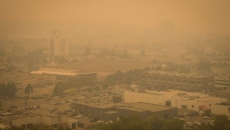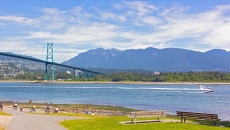Aaron Hill, executive director of the Watershed Watch Salmon Society in B.C., can't recall when he was so concerned about the snowpack levels in the province.
"We could get lucky and have a nice wet, rainy spring and summer and it could take a lot of the sting out of this, but if it's not, then we're in trouble," he said.
He's not the only one worrying. British Columbia's average snowpack is almost 40 per cent lower than normal according to the province's latest snow bulletin, raising concerns about what Premier David Eby called "some of the most dramatic drought conditions that have been seen in our lifetime."
The bulletin issued Thursday says levels remain "very low" at 61 per cent of normal.
That's substantially worse than this time last year, when the snowpack was 79 per cent of normal.
B.C. went on to experience deep and prolonged drought after a record-breaking heat wave in May spurred rapid melting and drying. Then came the province's devastating fire season.
Thursday's bulletin says the low snowpack combined with warm seasonal forecasts and "lingering impacts" from the previous drought are creating "significantly elevated drought hazards" for 2024.
The snowpack is especially sparse across the South Coast, ranging from 30 per cent of normal on Vancouver Island to 47 per cent in the Lower Fraser region.
The bulletin shows the Stikine region in northwestern B.C. has the highest snowpack in the province at 90 per cent of the average.
The conditions and forecast are concerning, the premier said.
"Knowing that water levels behind dams for (hydro power) are low, knowing that farmers didn't have enough water to grow feed for their cattle (last) summer, knowing the forest fire impacts we've seen, I am really worried about the summer that's coming up," Eby told an unrelated news conference on Thursday.
The only thing that "eclipses" his concern about drought is watching atmospheric rivers of rain sweep over California, causing landslides and flooding that have killed several people, he said, a reminder of B.C.'s devastating flooding in fall 2021.
Eby said it felt like the extreme weather B.C. is experiencing is an "early warning sign for the rest of Canada about what's coming with climate change."
Close to 100 wildfires continue to smoulder in the province, holdovers from last year's record-breaking fire season, he added.
"This marks the year when I learned that fires can actually burn underneath snow, I didn't know that was a thing."
Hill, from the Watershed Watch Salmon Society, said salmon depend on snowmelt to feed streams and rivers at every stage in their life cycle, from hatching out of gravel to returning from the ocean to spawn.
He said last summer's drought led to several fish mortality events, where rivers either ran dry or the shallow water heated up to temperatures lethal for salmon.
The lower the snowpack heading into the spring, he said, the earlier waterways are likely to reach flow levels that are "critically low" for salmon and their ecosystems.
The province's snow bulletin says seasonal weather forecasts from Environment Canada indicate a "very high likelihood" of above-normal temperatures across B.C. through April, with moderate likelihood projected between May and July.
There is less certainty with seasonal forecasts for precipitation, it notes.
The next snow bulletin is scheduled for release in early March.
The B.C. government has been working to develop a watershed security strategy with an expected release sometime this year.






